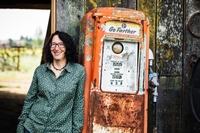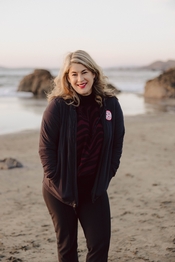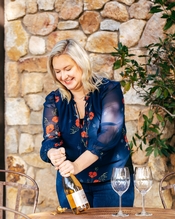Napa Valley is renowned for its world-class wineries and vineyards, but behind the wines exist women playing pivotal roles in shaping the region’s wine industry. These women, like Jill Matthiasson, Jaime Araujo, and Kelsey Phelps, are making significant contributions to Napa Valley’s winemaking and viticulture. They lead with tenacity, commitment, and perseverance in building a stronger community in Napa. I sat down with each of them to learn a bit about their journeys in the wine industry and how they are pushing traditional boundaries and raising the standards of what we drink:
Jill Matthiasson, Matthiasson Wines
Jill is a highly respected figure in the world of viticulture and winemaking, known for her expertise and dedication to sustainable farming practices. She, along with her husband Steve Matthiasson, has made significant contributions to the Napa Valley wine industry. She studied botany at Penn, researched ancient farming techniques in Israel, and studied traditional methods for soil health in grad school at UC Davis. Jill's commitment to producing high-quality, terroir-driven wines that reflect the

essence of the Napa Valley has garnered her a well-deserved reputation as a trailblazer in sustainable viticulture.
Miranda Franco (MF): What attracted you to the wine business initially? How did you get started?
Jill Matthiasson (JM): Jill shared that her work with organic farming and the farm-to-table movement sparked her interest in wine. “Gardening and winemaking share a remarkable similarity in the way they both revolve around the concept of timing and the need to carefully process and preserve the fruits of the land. While they might seem like entirely different pursuits, they are, at their core, deeply rooted in the rhythm of nature and the art of harnessing its bounty.”
MF: What’s one thing people wouldn’t know or expect about being a winemaker (or your path to becoming one)?
JM: “One thing that might surprise people about mine and Steve’s journey into this field is that we initially had no strong connection to wine or the deep knowledge of wine that many do that start a winery. We meet wine professionals who still know much more about the world of wine than we do. However, the passion remains the farming and the magical process that transforms an agricultural product into wine.”
MF: What do you hope to convey with your wines? What are your inspirations?
JM: Jill stressed a focus on a brightness and freshness that captures the essence of the vineyard and the grapes. They focus on making wines that are food-friendly and that also take their customers on a journey into unexpected varietals and the discovery of lesser-known and underappreciated grapes. “It’s all about inviting our customers to join us on this exciting exploration.”
MF: What changes and trends, if any, do you hope to see in the future of the wine industry?
JM: “I hope to see a continued shift towards more sustainable and organic practices and a collective responsibility to address climate change within the industry. I also hope to see more opportunities for those that have historically been excluded from the wine world and enhanced support for vineyard workers who make it all possible.”
MF: What is one piece of advice you would give other women working their way up in the wine industry?
JM: “Focus on your capabilities rather than paying attention to what others might think you can or cannot do.”
MF: What’s your go-to wine at the moment?
JM: Jill shared that she has been enjoying a bottle of Venusa Bianco (unfortunately for us in the U.S. this is not easily found here) a wine that captures a memorable trip she took to Venice with its distinct brininess, reminiscent of the sea breeze that sweeps across the Venetian lagoons.
Jaime Araujo, Trois Noix
Jaime Araujo is a visionary in winemaking, known for her dedication to crafting exceptional wines that reflect the Napa Valley terroir and the Araujo family's legacy. Jaime’s family has been making world-class wines in Napa Valley for decades. However, Jamie charted her path in Europe. After graduating from Georgetown, she moved to the UK, pursuing a theatre-acting career. However, a two-week internship at Möet Hennessy lasted three years and drove her back into the wine world. She then moved to France to start a marketing, strategy, and consulting firm focused on the wine industry. She eventually returned to Napa to become a vintner and created a wine that reflects her journey and what she loves most about wine: the people and the sense of community. The name “Trois Noix,” meaning, “Three Nuts,” is an homage

to her love of France and her commitment to using wine as a catalyst for social change.
MF: What attracted you to the wine business initially? How did you get started?
Jaime Araujo (JA): Jamie shared that growing up in the Araujo family, she had the privilege of being exposed to the world of wine and had an early opportunity as an intern at Joseph Phelps. Through those experiences, she was attracted to the strong sense of community in the Napa Valley wine industry. While she fell into the wine world by slight accident through her first job at Möet Hennessy, the captivating blend of artistry and intellectual challenge the business offers ultimately drew her in.
MF: What’s one thing people wouldn’t know or expect about being a winemaker (or your path to becoming one)?
JA: Winemaking is not just about working with grapes; it's also about connection. Jaime’s formal training in acting honed her comfort and ability to present and interact with people. She conveyed how “...essential these skills are to reading a room and understanding and responding to people’s emotions and reactions, which is incredibly valuable in the world of wine.”
MF: What do you hope to convey with your wines? What are your inspirations?
JA: “What I hope to convey and emphasize is that Napa wines are beautiful, fresh, and elegant. Most importantly, that quality and accessibility are at the heart of the Napa winemaking philosophy. Napa wines are for everyone and not exclusive to a select few but are to be appreciated by all wine lovers. Part of our B-Corporation certification (a designation that signifies a commitment to social and environmental responsibility and sustainable business practices) and the work we do with various associations is about bringing the essence of Napa to a broad audience and sharing that Napa wines can be enjoyed by all no matter where you come from.”
MF: What changes and trends, if any, do you hope to see in the future of the wine industry?
JA: "I’d love to see the Napa Valley wine industry continue and intensify its commitment to diversity and inclusivity by welcoming and empowering individuals from all backgrounds to participate and thrive in all aspects of the industry. I would also love to see us embrace grape varieties beyond the traditional dominance of Cabernet Sauvignon. Napa should show off varieties that thrive here, like Merlot, Cabernet Franc, and Sauvignon Blanc. Celebrating the full spectrum of what our region can produce is one step toward a sustainable future. The Matthiassons, for example, have done a remarkable job at showcasing lesser-known varieties in the region.”
MF: What is one piece of advice you would give other women working their way up in the wine industry?
JA: “Find great mentors, hold out your hands, get lifted up, and then lift others along the way. There is always someone you can help. Definitely explore the Bâtonnage Forum Mentorship Program.”
MF: What’s your go-to wine at the moment?
JA: “I’m a “Chardy” girl – whether it’s Champagne, Chablis or California Chardonnay. I had a Tasmanian Chardonnay the other day that was out of this world. I love that it can be made in so many diverse styles and expressions.”
Kelsey Phelps, SEPPI
Kelsey Phelps, the granddaughter of legendary vintner Joseph Phelps, is making her mark in the world of wine as the founder of SEPPI sparkling wine. The name “SEPPI” was Kelsey’s childhood nickname for Joe, who was taken with Italy at the

time and decided he wanted to be called “Giuseppe” instead of Grandpa. Kelsey paved her path practicing law, but the art of winemaking tugged at her, and she began building on her family's rich winemaking heritage. SEPPI is a testament to her dedication to producing high-quality sparkling wines that capture the essence of California's diverse terroir while honoring the tradition and methods classic to the Champagne region of France. Kelsey's commitment to excellence has established her as a rising star in the industry.
MF: What attracted you to the wine business initially? How did you get started?
Kelsey Phelps (KP): Kelsey shared that by the time she was born, her grandfather was a decade into building his eponymous winery, so an appreciation for the culinary arts and wine was deeply engrained from an early age. However, like her grandfather, becoming a vintner was her second career. “I graduated from law school and practiced corporate law in Silicon Valley before transitioning into wine. Spending my rare time off from law firm work with my Grandpa in the last years of his life inspired me to pursue my passion and gave me the courage to make the transition,” Kelsey stated.
MF: What’s one thing people wouldn’t know or expect about being a winemaker (or your path to becoming one)?
KP: “I was terrified of stepping outside of my family’s established business to start SEPPI, but I pushed myself to do it because I knew it was the better choice for me in the long run, and I had a vision and a passion that I wanted to bring forward. I was especially anxious in the first three years while pouring my savings into the company before the first wines were ready to be released. I started with only a Blanc de Blancs and a Brut Rosé because those are my favorite styles of sparkling, but I feared I might have hundreds of cases to drink myself if the wine didn’t sell. I’ll never forget the feeling of relief and accomplishment when the first vintage turned out to be delicious, and I’m so grateful to be able to expand the company from there.”
MF: What do you hope to convey with your wines? What are your inspirations?
KP: Kelsey stressed that her passion is collecting wine. “I love that wine can be a gateway to understanding a window of time, the unique characteristics of a place, and the cultural context in which it was produced. I love to compare and contrast wines and think about what was happening in the world when they were made and what factors contributed to the final taste in the bottle. With SEPPI, I try to capture this collector’s spirit by focusing on single vineyards well known for producing incredible still Chardonnays and Pinots to explore what the same terroir can do for sparkling wine. Also, unlike most producers from Champagne, SEPPI only makes vintage wines (instead of blends between years), so you can see the influence of each unique growing season.”
MF: What changes and trends, if any, do you hope to see in the future of the wine industry?
KP: “I would love to see the industry become more inclusive, and as one of the many ways to accomplish this, I think we need to reduce the intimidation and snobbishness factor that can accompany wine. I think many people are afraid of jumping in and joining the conversation on both the consumer and production side because they don’t want to be “incorrect,” to a certain extent, the industry has reinforced this dynamic. Wine should be fun; keeping that in mind is one small way to open the conversation and include more voices. I also hope to see more people drink American sparkling!”
MF: What is one piece of advice you would give other women working their way up in the wine industry?
KP: “Keep going. This applies to both men and women, but women face unique and more significant challenges in a historically male-dominated industry. It’s easy to become discouraged, but I’m learning that challenges are the norm, and the successful people I look up to have figured out how to embrace solving problems – even the unfair problems -- as a daily practice. Cultivate an attitude of resilience, and don’t let the challenges, of which there will be many, weigh you down.”